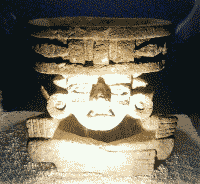Infectious bacteria have for the first time been caught performing biological alchemy to transform parts of a host body into those more suited to their purposes, by a team in Edinburgh.
The study, in the journal Cell, showed leprosy-causing bacteria turning nerves into stem cells and muscle.
The authors said the clever and sophisticated technique could further therapies and stem-cell research.
Experts described the discovery as amazing and exciting.
Alchemists may have failed to morph base metals into gold, but a team at the University of Edinburgh has shown that bacteria can transform parts of the body into something more valuable to them.
It is a feat that scientists have already achieved in the laboratory. Skin cells have been transformed into flexible stem cells that can become any of the body's building blocks from heart muscle to brain cells.
One of the researchers, Prof Anura Rambukkana, said: Our body's cells can be manipulated and why would a bacterium not take advantage of that?
Master manipulators
Experiments on mice and cells grown in the laboratory showed the leprosy bug infected nerve cells. Then over a period of a few weeks the bacteria began to subvert the nerves for their own ends. The chemistry of the cells changed and they became stem cells.
These can grow and spread around the body, unlike the static nerves.
This is a stem cell that is generated by the body's own tissue so the immune system does not recognise it and they can get any place they want without being attacked, said Prof Rambukkana.
Those cells could lodge inside muscle and become muscle cells.
We realised, 'Wow, this is something very, very striking'.
It's the first time a bacterial infection has been shown to make stem cells, that's the big thing here.
'Alchemy'
He hopes the findings will increase understanding of leprosy and lead to new ways of developing stem cells - which have been touted as future treatments for a range of diseases.
Prof Rambukkana also believes it is probable that other species of bacteria would have evolved the same ability to reprogramme their host.
Prof Chris Mason, a specialist in stem cell research at University College London, said: The ability of bacteria to convert one mammalian cell type to another is 'alchemy' by nature on a grand scale.
Whilst this amazing discovery is in a mouse model, it highlights the extraordinary complexity of the interactions between mammals and bacteria and the ingenuity of scientists to uncover disease mechanisms that a decade ago would have been beyond science fiction.
The next essential step is to translate this valuable piece of knowledge into tangible benefits for patients - a process that may take a decade before its relevance to clinical medicine is fully understood.
Prof Diana Lockwood, from the London School of Hygiene and Tropical Medicine, said: Their finding that bacteria can reprogramme cells is very interesting and exciting.
However, she cautioned that there was quite a gap between this and clinical leprosy and I don't think it's going to lead to new treatments.
Dr Rob Buckle, head of regenerative medicine at the Medical Research Council, said: This discovery is important not just for our understanding and treatment of bacterial disease, but for the rapidly progressing field of regenerative medicine.
Source: http://www.bbc.co.uk/news/health-21056644
Buncha hackers...

